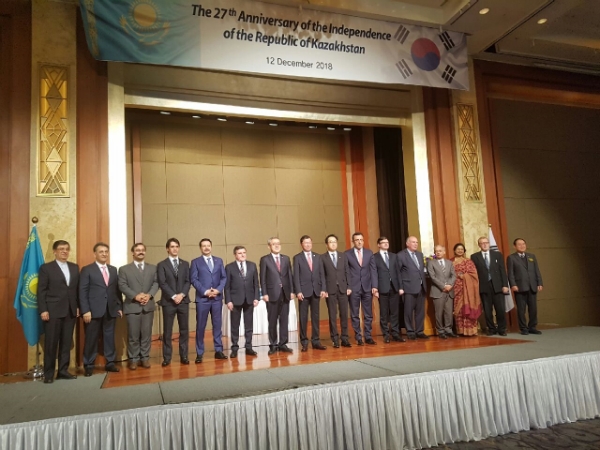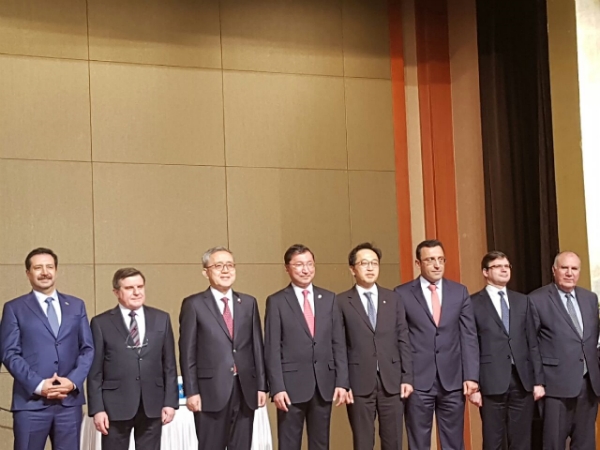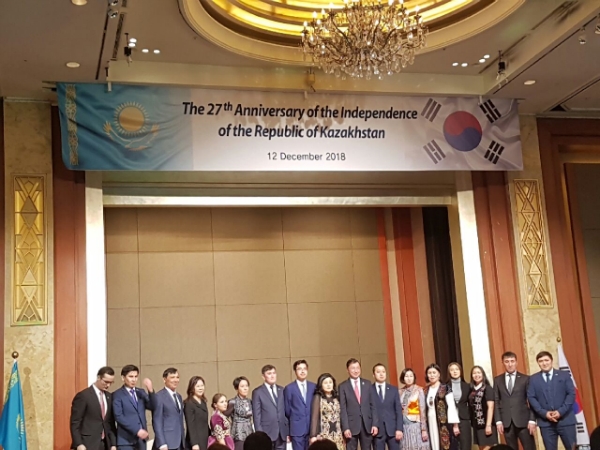At the time when Kazakhstan declared its independence from the Soviet Union on Dec., 1991, Kazakhstan has possessed its strategic weapons of a total of 1,400 as well as a total of 100 ICBM missiles, according to its international observers.
But Kazakhstan chose its economic development rather than developing further strategic weapons and missiles, not missing out its opportunity to advance into a hub country in the Central Asia region in various areas.

Kazakhstan Embassy’s 27th Independence anniversary held in a downtown hotel Seoul on Dec. 12th evening hosted by new-accredited Kazakhstan envoy H.E. Bakyt Dyussenbayer & his spouse proved that its government’s decision has been right in front of its invited 200 guests including the Seoul Diplomatic Corps.
Alongside of the fact that Kazakhstan became an international center in terms of religion and culture, its capital Astana emerged as a hub of the Eurasia continent as well, said Dyussenbayer through his welcome remarks.
Touching upon the outcome of Foreign Minister’s Official Visit to Kazakhstan on April, this year, Kazakhstan envoy said that during her courtesy call on President Nazarbaev, Minister Kang relayed warm regards from President Moon Jae-in as well as his message that the Republic of Korea and Kazakhstan, which have seen remarkable advances in their relations over the past 25 years since the establishment of diplomatic relations in 1992, should work together to take their ties a notch higher.

According to MOFAT, the two sides, bringing attention to the similarities between the ROK’s New Northern Policy and Kazakhstan’s “Nurly Zhol” policy, agreed to work more closely together in the areas of transportation and logistics.
The “Nurly Zhol” policy, announced in November 2014, is Kazakhstan’s new economic policy designed to tackle its economic crisis amid the worsening global economic situation. The policy mainly calls for the development of infrastructure, including in the sectors of transportation, logistics, energy, industry, and social infrastructure; for modernizing housing, water and heating facilities; and for rendering assistance to small- and medium-sized enterprises.
Minister Kim Ban-suk from the Ministry of Personnel Management who was on hand on behalf of the government, touched upon the ever-growing people-to-peopls contacts between the two nations, mentioning that Kazakhstan peoples visit Korea every year with the number of annual 45,000 persons whereas Korean peoples visit Kazakhstan with the number of annual 34,000 peoples as of the end of 2017.

Moreover, a total of 100,000 Goryeo peoples, Korean descendants play a ring role to connect the two countries and a total of 1,000 Kazakhstan students are studying at various universities on the peninsula, according to Kim.
Vice-chair Keum Tae-seok from the Korea-Kazakhstan Parliamentary Group who is a member of the National Assembly also, said that the two countries calling Kazakhstan the ROK’s top trade partner and investment destination in Central Asia as well as a major cooperative partner for the ROK government’s New Northern Policy, suggested that the two countries diversify in a future-oriented manner the scope of substantive cooperation beyond the energy and resource sectors.

